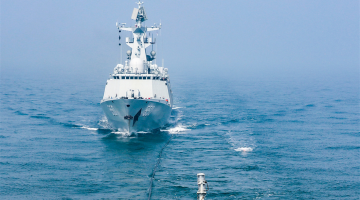By Chen Yang
Chinese Foreign Minister Wang Yi and his Japanese counterpart Taro Kono decided at a meeting in Beijing Sunday to restart the reciprocal visits of Japanese Prime Minister Shinzo Abe and Chinese President Xi Jinping. Chinese Premier Li Keqiang also met Kono and noted the positive momentum in Sino-Japanese ties.
Talks held during the weekend indicate the importance China attaches to improving relations with Japan.
Since Abe returned to power at the end of 2012, Japanese foreign ministers have officially visited China just twice. But Kono's visit came sooner after he took office than his predecessor Fumio Kishida, who made the trip four years after becoming Japanese foreign minister in late 2012.
The smooth visit by Kono may be attributed to the favorable reputation his father Yohei Kono enjoys in China and his friendship with Wang Yi. But the main reason is the climate of improving Sino-Japanese relations.
From May 2017, the Abe administration began to extend an olive branch to China and exchanges between the two countries started to increase.
In May 2017, Abe sent special envoys to attend the Belt and Road Forum for International Cooperation in Beijing. On September 28, he visited the Chinese Embassy in Tokyo to attend National Day celebrations. In November, a record 250-strong delegation of Japanese business and entrepreneurial heavyweights visited China. And in December, the seventh meeting of the China-Japan ruling party exchange mechanism was held in Xiamen, Southeast China's Fujian Province, followed by another meeting of the bilateral exchange mechanism between China's National People's Congress and Japan's House of Councilors in Tokyo in January.
Earlier, in his first policy speech to both houses of parliament on January 22 after his re-election, Abe said he wanted Japan to improve ties with China and push forward cooperation with Beijing for Asian infrastructure. If the Abe administration can maintain this attitude, the last piece of "ice" in the bilateral relationship is expected to melt.
The improvement and development of Sino-Japanese relations suits the interests of citizens of both countries. It will also be a valuable diplomatic asset for the Abe administration. Quite a number of features of Abe's diplomacy in the past two years stand out. For instance, Japan hosted the G7 summit in 2016. Later that year, Abe accompanied then US president Barack Obama to Hiroshima and made a symbolic visit to Pearl Harbor. He was the first foreign leader to meet then US president-elect Donald Trump. He also welcomed Russian President Vladimir Putin in Japan.
Looking ahead, Abe's diplomatic prominence will be quite limited in 2018. Leaders of the US and Russia are unlikely to visit Japan this year and no major international conference is planned in the country. Under such circumstances, if Abe can push forward a trilateral summit with China and South Korea, manage to visit China and succeed in realizing Xi's visit to Japan, he will score a diplomatic triumph.
In addition, the Liberal Democratic Party is set to hold leadership elections in September. A benign relationship with China will undoubtedly be Abe's most important political leverage, which will help secure a third term.
The Abe administration has taken pains to mend ties with China. Beijing must have realized the good intentions of the Abe administration, or it would not have received Kono during a weekend.
But some other moves by Tokyo detract from the sincerity of its attempts to court Beijing. For example, Japan is promoting a quadrilateral security dialogue with the US, India and Australia and is also trying to implement the "free and open Indo-Pacific strategy."
Recently, Japanese media gave extensive coverage to Chinese warships and submarines sailing near the Diaoyu Islands. Japan even displays documents to defend its territorial claims at the National Museum of Territory and Sovereignty in Tokyo. All these moves will only hurt China-Japan relations.
Kono's visit signals a good start for bilateral relations in 2018, but Japan needs to put thought into avoiding the bumps as the two countries try to restore ties.
The author is a PhD candidate with the Tokyo-based Toyo University.









